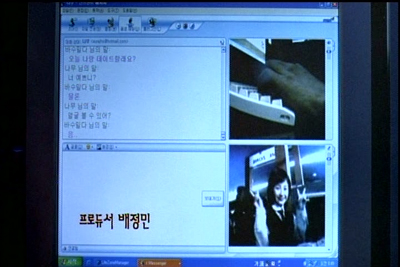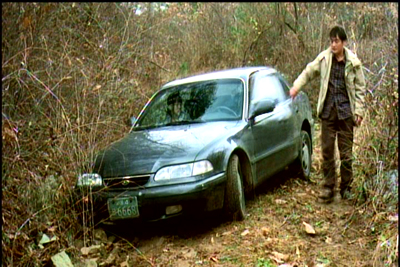
 BUY IT AT AMAZON: CLICK HERE!
BUY IT AT AMAZON: CLICK HERE!
STUDIO: Tartan Video
MSRP: $24.99
RATED: R
RUNNING TIME: 97 Minutes
SPECIAL FEATURES:
• Photo gallery
• Trailers
The Pitch
"Sympathy
for Miss Teen Whore"
The Humans
Han
Yeo-reum as protagonist Yeo-jin, Seo Min-jung as the most adorable amateur
prostitute ever, and Eol Lee as Yeo-jin’s downtrodden father.
The Nutshell
Two high
school freshmen, Yeo-jin and Jae-yeong, are bound and determined to take a
sightseeing trip to
prostitution. They come up with a nice little racket — the calm and
businesslike Yeo-jin handles making the appointments and keeping track of the
money, while lively Jae-yeong takes care of the customers.

"V for Vagina!"
Life
can’t be all rainbows and sex for money, though; in an accident involving a
police raid, Jae-yeong takes her own life. Crushed by the loss of her friend
(her very good friend, nudge and
wink) Yeo-jin sets out on a quest for personal redemption, which leads her into
the beds of every man that she had set up with Jae-wong.
Unbeknownst
to Yeo-jin, her father is aware of her sexual escapades, and her actions have
wounded him deeply. Playing parallel to Yeo-jin’s favors to her clients, her
father begins to punish those men who would take advantage of his daughter, acting
as a nervous shadow of retribution behind her.
The Lowdown
The core
motivations of Yeo-jin and her father create a wonderful tug-of-war for the
narrative, a push/pull of methodology in pursuit of reconciliation. Yeo-jin
burns herself up with grief and imagines a distance between her and Jae-yeong
which she seeks to close by adopting her friends behaviors. At the same time,
Yeo-jin’s father sees an actual distance growing between himself and his
daughter, which he believes can only be bridged by purifying Yeo-jin, returning
her to a state of innocence. Futile tasks, both, but played to great tension.
Director
Kim Ki-duk has proven himself repeatedly at taking stories that are plot-light
and lending them a weight by way of his tight focus, sort of like an earnest
child glaring at a trickle of water until it becomes the only river in the
world. Samaritan Girl has the complexity of character (and, moreso,
character motivation) that makes such a narrowly-viewed world intriguing, despite
the potential to end up as nothing more than a curiosity for the outside
observer.

"Ramming speed, you whelp!"
At its
heart, Samaritan Girl is an odd sort of revenge fantasy. It’s easy to
contrast with Kim’s contemporary, Park Chan-wook’s vengeance trilogy, though. Oldboy,
for example, is plot-heavy and
character-heavy, and goes to great lengths to achieve a grounded sense of
fantasy — a grittiness that tricks the audience into accepting the story as
true-to-life. It’s hard to pinpoint exactly what qualities make the difference,
but Samaritan
Girl seems not to try for that realism, which gives the whole film a
bit of disconnect. Though you are shown suicides, beatings, and murders, it
hovers out of reach like a barely-remembered dream.
Further
distancing it from reality is the monotone emotion. I should probably say
tri-tone emotion, since there are three distinct sections governed by three
distinct emotional masters, but the point is that Kim’s film has an deliberate
evenness, like a still pond — a quality that is present in all of the auteur’s
films, most notably Spring, Summer, Fall, Winter … and Spring. None of the
spontaneous, goofball levity that sparks in other Korean drama is present here.
The only bright rays through the clouds are those provided by Jae-yeong, and those
are stifled up just as quick as can be.
I
mentioned Kim’s penchant for highly structured plots. He likes noticeable
divisions in his story, making them feel like well-connected vignettes. The
screenplay for Samaritan Girl wouldn’t work to educate students in the
"proper" method of script-writing, however, since the traditional
three acts (build-up, conflict, payoff) are jettisoned in favor of Kim’s own
particular idea of what each structural element should provide.

Did you know the number of the beast is actually 616? Funny.
The first
act, titled "Vasumitra" after a famous Hindu prostitute, focuses on
the loss of innocence, which is handled innocently enough. Jae-yeong is a girl
to fall in love with, and many men do. She does not consider her actions as
sins, and in fact displays a childlike wish to spread her love as widely as
possible. It’s a romantic ideal, but one that doesn’t break for her, right up
to her death. Yeo-jin is the one who has her innocence crushed, but it’s to
make room for guilt and shame for bringing about Jae-yeon’s death. The
sexuality hardly even enters into it. At least, up until act two.
"
soap-opera feel of the first act and shifts focus to Yeo-jin’s father. Kim
makes this section very similar in feel to a cop story, with frequent
stakeouts. This is also the act in which all the violence takes place. Though
the individual scenes are few, they are heavy in brutality. This is the ground-level
act, not as concerned with the reclamation of innocence as with the methods
used to do so, from Yeo-jin’s sexual escapades to her father’s backlash of
violence.

Turnabout’s fair play.
The third
act, "Sonata," is the compromise between the first two, the
correction of the extremes, and it accomplishes its task with barely any
dialogue. After so much time spent in unwitting conflict, Yeo-jin and her
father take a trip out into the countryside. That trip, and the return journey,
create change with small scope but wide implication. The game of back-and-forth
between Yeo-jin and her father ends with no clear victor — just two pairs of
supremely tired arms. Redemption is never attained, but the possibility of redemption rings through,
making Samaritan Girl a sort of study of broad failure, about people
who are defined by their individual failures.
The
structure allows for some plot- and motivation-twisting, but on the whole the
surface of this placid pond is concealing a fairly rocky bottom. It’s hard to
get your footing in Samaritan Girl and even harder to keep it. Kim has a steady
hand a knack for withdrawing poignant performances from subtle ingredients, but
the impact of this film is lessened by its half-hearted investment in character
consistency. Not to say that the impact is made slight; Samaritan Girl isn’t
Kim’s most challenging work to date, nor his most rewarding, but it is a
well-crafted morality play full of bitter tension and bearing the conflicted
beauty of a noble suicide.

Guys always flinch.
The Package
The first
striking thing about this disc is the beautiful cover art. It is very simple,
Yeo-min in what appears to be a nun’s headdress and powdered head-to-toe on her
naked body with alabaster white. It’s simple and attractive, made doubly so by
the contrast with the film’s subtitle: "A Dark Tale of Revenge,"
which only errs a little on the side
of marketing-speak. Maybe "A Dark Tale that Also Has Some Revenge"
would be better, but eh.
The
second striking thing about this disc is, uh, that it has no special features.
Nothing important, anyway. You want a photo gallery? Then you’re in luck, and
easily amused. There are also a few trailers for other Tartan releases.
Fortunately,
the video and audio are both fantastic. Kim sure does like his color templates,
and they’re represented in fine detail in the transfer. A DTS soundtrack is
available alongside the standard Dolby Digital 5.1, and both are just
serviceable. The DTS almost seems extraneous, though, since the sound design is
not particularly compelling.
Yeah, I
also complain when people give me presents for which I didn’t ask.
8.3 out of 10